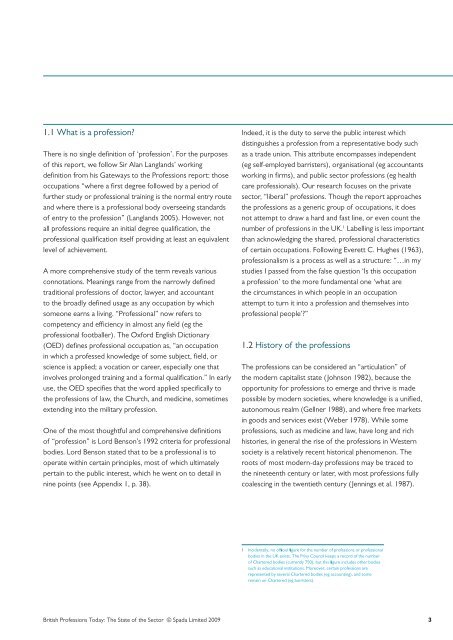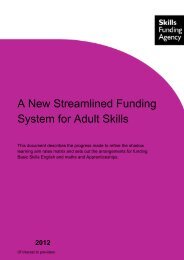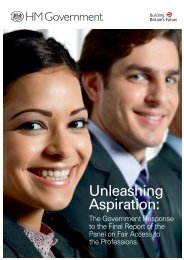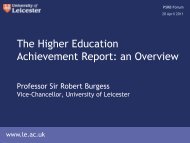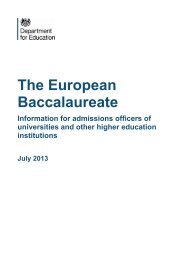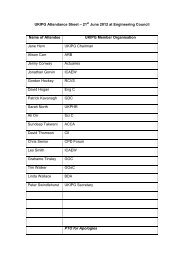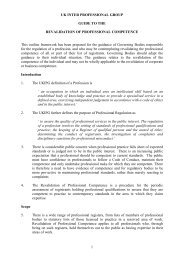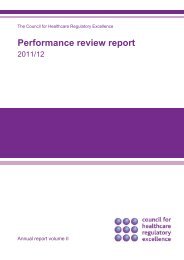BRITISH PROFESSIONS TODAY: THE STATE OF ... - Property Week
BRITISH PROFESSIONS TODAY: THE STATE OF ... - Property Week
BRITISH PROFESSIONS TODAY: THE STATE OF ... - Property Week
You also want an ePaper? Increase the reach of your titles
YUMPU automatically turns print PDFs into web optimized ePapers that Google loves.
1.1 What is a profession?<br />
There is no single definition of ‘profession’. For the purposes<br />
of this report, we follow Sir Alan Langlands’ working<br />
definition from his Gateways to the Professions report: those<br />
occupations “where a first degree followed by a period of<br />
further study or professional training is the normal entry route<br />
and where there is a professional body overseeing standards<br />
of entry to the profession” (Langlands 2005). However, not<br />
all professions require an initial degree qualification, the<br />
professional qualification itself providing at least an equivalent<br />
level of achievement.<br />
A more comprehensive study of the term reveals various<br />
connotations. Meanings range from the narrowly defined<br />
traditional professions of doctor, lawyer, and accountant<br />
to the broadly defined usage as any occupation by which<br />
someone earns a living. “Professional” now refers to<br />
competency and efficiency in almost any field (eg the<br />
professional footballer). The Oxford English Dictionary<br />
(OED) defines professional occupation as, “an occupation<br />
in which a professed knowledge of some subject, field, or<br />
science is applied; a vocation or career, especially one that<br />
involves prolonged training and a formal qualification.” In early<br />
use, the OED specifies that the word applied specifically to<br />
the professions of law, the Church, and medicine, sometimes<br />
extending into the military profession.<br />
One of the most thoughtful and comprehensive definitions<br />
of “profession” is Lord Benson’s 1992 criteria for professional<br />
bodies. Lord Benson stated that to be a professional is to<br />
operate within certain principles, most of which ultimately<br />
pertain to the public interest, which he went on to detail in<br />
nine points (see Appendix 1, p. 38).<br />
Indeed, it is the duty to serve the public interest which<br />
distinguishes a profession from a representative body such<br />
as a trade union. This attribute encompasses independent<br />
(eg self-employed barristers), organisational (eg accountants<br />
working in firms), and public sector professions (eg health<br />
care professionals). Our research focuses on the private<br />
sector, “liberal” professions. Though the report approaches<br />
the professions as a generic group of occupations, it does<br />
not attempt to draw a hard and fast line, or even count the<br />
number of professions in the UK. 1 Labelling is less important<br />
than acknowledging the shared, professional characteristics<br />
of certain occupations. Following Everett C. Hughes (1963),<br />
professionalism is a process as well as a structure: “…in my<br />
studies I passed from the false question ‘Is this occupation<br />
a profession’ to the more fundamental one ‘what are<br />
the circumstances in which people in an occupation<br />
attempt to turn it into a profession and themselves into<br />
professional people’?”<br />
1.2 History of the professions<br />
The professions can be considered an “articulation” of<br />
the modern capitalist state (Johnson 1982), because the<br />
opportunity for professions to emerge and thrive is made<br />
possible by modern societies, where knowledge is a unified,<br />
autonomous realm (Gellner 1988), and where free markets<br />
in goods and services exist (Weber 1978). While some<br />
professions, such as medicine and law, have long and rich<br />
histories, in general the rise of the professions in Western<br />
society is a relatively recent historical phenomenon. The<br />
roots of most modern-day professions may be traced to<br />
the nineteenth century or later, with most professions fully<br />
coalescing in the twentieth century (Jennings et al. 1987).<br />
1 Incidentally, no offi cial fi gure for the number of professions or professional<br />
bodies in the UK exists. The Privy Council keeps a record of the number<br />
of Chartered bodies (currently 750), but this fi gure includes other bodies<br />
such as educational institutions. Moreover, certain professions are<br />
represented by several Chartered bodies (eg accounting), and some<br />
remain un-Chartered (eg barristers).<br />
British Professions Today: The State of the Sector © Spada Limited 2009 3


